Commercial spaces face significant challenges from ant infestations due to their favorable habitats and diverse food sources. Effective ant control requires understanding ant behavior, life cycles, and early activity indicators. Businesses should implement preventive measures like regular inspections, eliminating food sources, sealing entry points, and using natural repellents. In case of persistent or severe infestations, engaging professional ant control services is crucial to eradicate colonies and maintain a safe working environment. Integrated Pest Management (IPM) strategies, combining habitat manipulation, mechanical exclusions, and biological controls, offer sustainable and effective ant control solutions.
Ant infestations can disrupt business operations and damage commercial spaces. Understanding these pervasive pests, their behavior, and impact is crucial for effective ant control. This guide delves into various aspects of ant management in commercial environments. From identifying signs of activity to exploring modern eco-friendly solutions and traditional methods, you’ll gain insights on maintaining an ant-free zone. Learn when to call professionals and discover successful case studies, empowering you to implement robust ant control strategies for your business.
Understanding Ant Infestations in Commercial Spaces
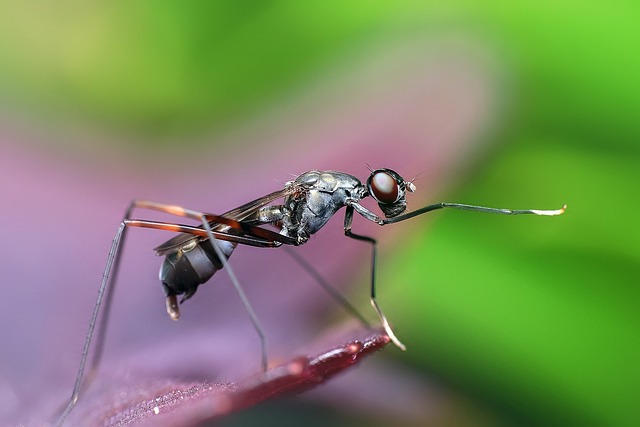
Ant infestations in commercial spaces can quickly become a significant problem, impacting both the environment and operations. Understanding the behavior and life cycle of ants is crucial for effective ant control. These social insects live in organized colonies with distinct roles, allowing them to establish and expand their presence swiftly. Commercial spaces, with their diverse food sources and hiding places, provide ideal habitats for ants.
Business owners must recognize that ants can enter through various entry points, from tiny cracks and gaps to employee bags or delivered goods. Once inside, they leave a chemical trail, known as pheromones, which helps other ants locate food sources. Regular inspections are essential to identifying these trails and potential nest sites. Timely ant control measures, including eliminating food sources, sealing entry points, and employing professional pest control services, can help prevent and manage infestations effectively.
The Impact of Ants on Business Operations
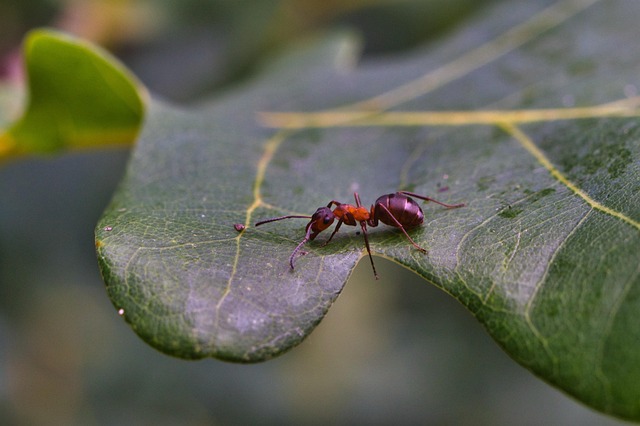
Ants, though small in size, can have a significant impact on business operations. Their presence can disrupt daily activities and cause potential damage to structures and equipment. In commercial settings, ants may infest food storage areas, leading to contamination and spoilage, which directly affects productivity and profitability. Moreover, ant colonies can establish themselves within machinery or walls, causing costly repairs and downtime.
Effective ant control is essential for maintaining a thriving business environment. Professional pest control services offer tailored solutions, utilizing advanced techniques and eco-friendly products to eliminate ant infestations. By addressing the issue promptly, businesses can safeguard their reputation, ensure a safe working space, and prevent financial losses associated with ant-related damage and disruptions.
Identifying Signs of Ant Activity
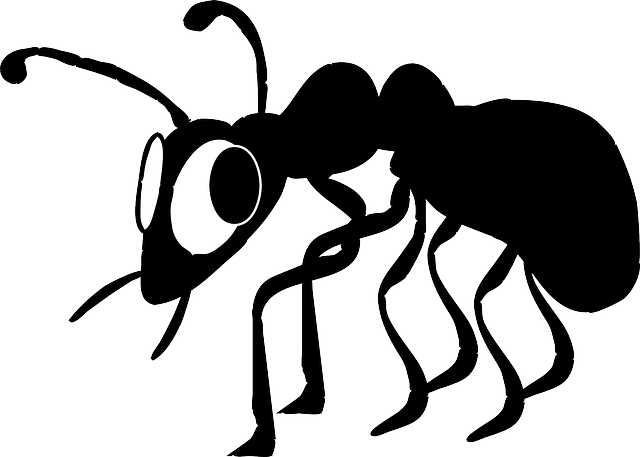
Ants are relentless intruders that can quickly take over any business premises if left unchecked. Identifying ant activity early is key to effective ant control for businesses. Keep an eye out for telltale signs such as worker ants scurrying across floors, walls, or near food sources. These visible trailblazers often indicate a larger colony nearby. Additionally, look for small holes or tunnels in carpets, cracks in walls, and any evidence of ant nests, especially around windowsills, doors, or baseboards.
Ants leave chemical trails that guide other ants to food sources, so even faint scent trails can signal an impending invasion. If you notice areas where ants seem to congregate or follow a specific path, this could be a clear indication that professional ant control measures are necessary to protect your business and its assets from these persistent pests.
Preventive Measures for Effective Ant Control
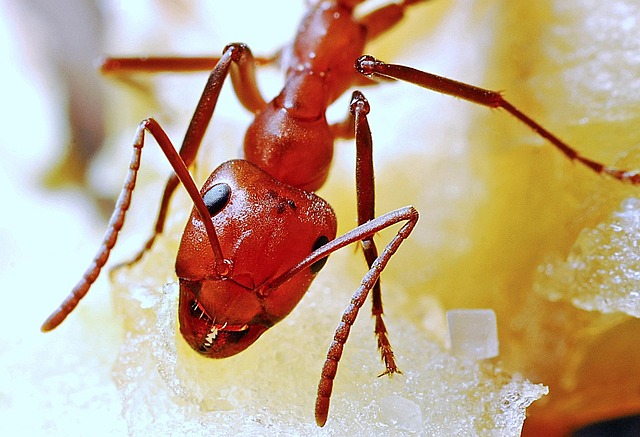
Ant control is a multifaceted approach, and businesses should focus on both short-term solutions and long-term preventive measures for effective ant management. Regular inspections are key; identifying ant trails and sources of food or water can help in understanding their behavior and location. Keeping premises clean and free from spills or crumbs creates an unappealing environment for ants.
Implementing a strict hygiene protocol, including regular sweeping, mopping, and sealing entry points like cracks and gaps, can significantly deter ants. Additionally, using ant-repellent plants around the perimeter of the business, maintaining proper drainage to avoid waterlogging, and storing food in sealed containers are simple yet effective preventive measures.
Traditional Ant Control Methods
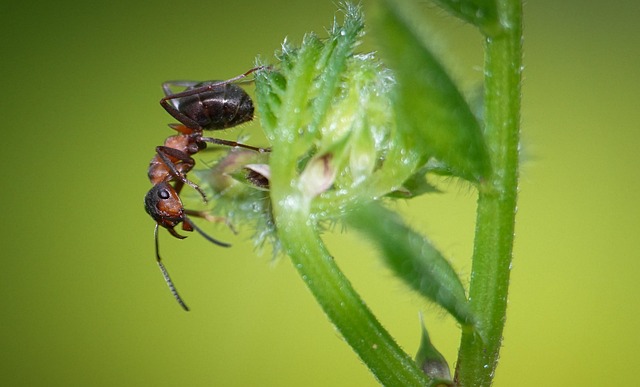
Ants are relentless invaders that can quickly infest businesses, causing damage and disrupting operations. Traditional ant control methods often rely on toxic chemicals, which may provide temporary relief but come with health and environmental risks. These methods include spraying insecticides and setting baits, though they might not eradicate the entire colony and can lead to the development of chemical resistance in ants over time.
For more effective and sustainable ant control, businesses should consider integrated pest management (IPM) strategies. IPM approaches focus on long-term solutions by combining various methods such as habitat manipulation, mechanical exclusions, and biological controls. Trained professionals employ these techniques to identify ant entry points, eliminate food sources, and introduce beneficial insects that prey on ants, offering a safer alternative to chemical pesticides.
Modern, Eco-Friendly Ant Control Solutions
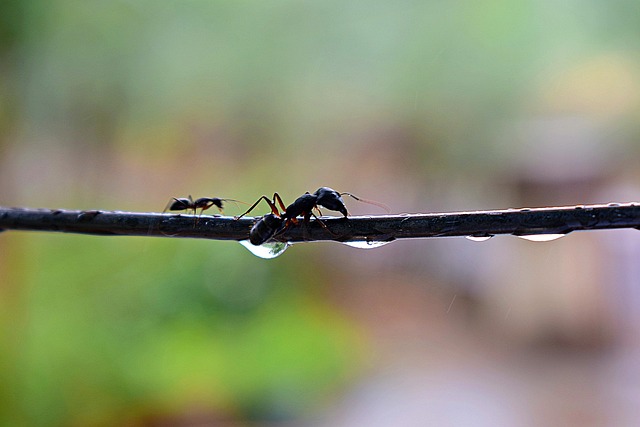
In today’s world, businesses are seeking modern and eco-friendly ant control solutions that balance effectiveness with environmental responsibility. Traditional methods often rely on toxic chemicals, which can pose risks to both employees and the broader ecosystem. However, innovative advancements in pest management offer safer alternatives. These include natural repellents, targeted baiting systems, and even specialized ants that can be introduced to neutralized existing infestations without harming other organisms.
One prominent trend is the use of essential oils and plant-based extracts as ant deterrents. Compounds like peppermint, citronella, and neem oil have shown promise in repelling ants due to their strong scents. Additionally, heat treatments and mechanical methods, such as sealing entry points and maintaining clean environments, can significantly reduce ant populations. These eco-conscious approaches not only protect businesses from costly damages but also contribute to a healthier, more sustainable work environment.
Tips for Maintaining an Ant-Free Environment
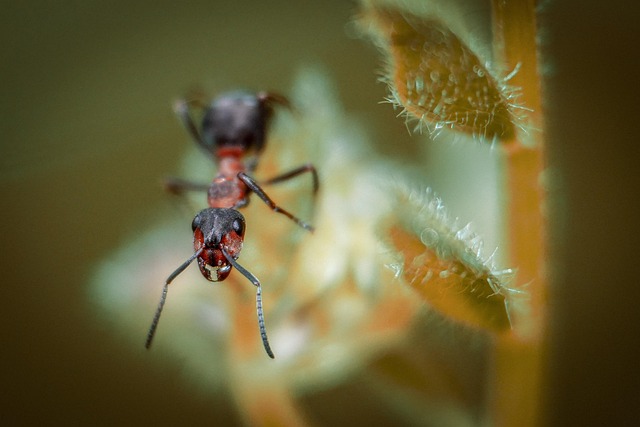
To maintain an ant-free environment, regular cleaning and sanitization are paramount. Businesses should ensure thorough wiping down of surfaces, especially in food preparation areas, to eliminate sugar and protein traces that attract ants. Regularly vacuuming floors and emptying trash bins promptly also helps deter these pests. Additionally, sealing entry points like cracks and gaps around doors and windows can prevent ants from finding their way inside.
Implementing an integrated pest management (IPM) strategy is another effective measure. This involves identifying and addressing ant infestations early through inspection, trap placement, and targeted treatments. Utilizing natural repellents like lemon juice or peppermint oil can also serve as a non-toxic alternative to chemical insecticides. Regular inspections and proactive measures will go a long way in maintaining an ant-free business environment, ensuring both customer satisfaction and compliance with health and safety standards.
When to Call in Professional Pest Control Services

Ant infestations can quickly spiral out of control, especially for businesses dealing with food or having complex structures. If you notice persistent ant activity despite your best efforts to manage it, it’s time to consider professional ant control services. Look out for consistent ant trails leading to and from potential food sources, visible ant nests, or large numbers of ants gathered in one place. These are clear signs that a professional intervention is needed.
Business owners should also reach out to pest control experts if they suspect a severe infestation due to the potential health risks and operational disruptions caused by ants. Ant control professionals bring advanced equipment and expertise to effectively eliminate ant colonies, ensuring your business environment remains safe, hygienic, and free from these pesky intruders.
Case Studies: Successful Ant Control Strategies for Businesses
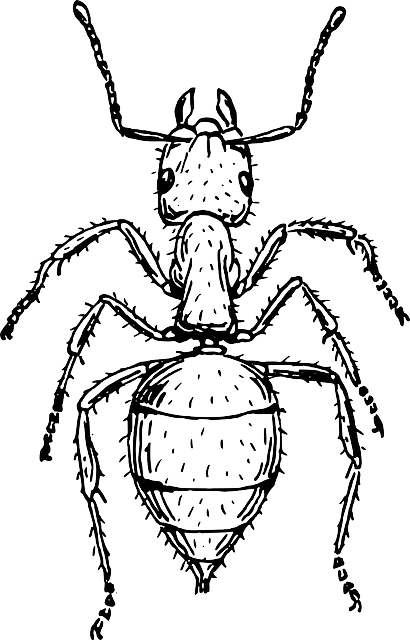
Successful ant control strategies for businesses often involve a combination of prevention and treatment methods, as outlined in various case studies. One notable example is the implementation of integrated pest management (IPM) programs. These comprehensive approaches include identifying and eliminating food sources, sealing entry points, and using targeted pesticides only when necessary. For instance, a restaurant chain successfully reduced ant infestations by regular cleaning, proper storage of food, and the use of bait stations strategically placed around high-risk areas.
Another case highlights the effectiveness of pheromone traps in monitoring and controlling ant populations. This method involves using synthetic versions of ants’ natural scent trails to lure and capture them. A retail store found this strategy particularly useful for tracking ant movements and pinpointing their nests, enabling them to focus their control efforts more precisely. These real-world applications demonstrate that tailored, science-backed methods can significantly mitigate ant control challenges faced by businesses.
